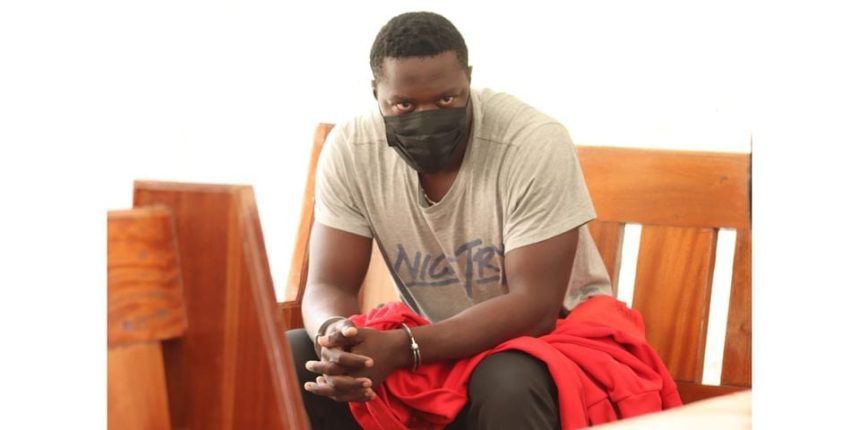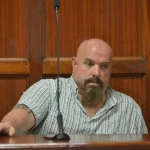Former Kenya Sevens player Alex Olaba was on Wednesday jailed for six years for threatening to kill a witness in a rape case and two years for interfering with the judicial process.
The sentences will run concurrently, meaning that he will serve for six years. The trial Magistrate Geoffrey Onsarigo slapped Olaba with the sentence after finding him guilty of two charges of attempted murder and interference of witnesses in the case in which he is charged alongside former Kenya Rugby Seven player Frank Wanyama over gang rape that was pending in court.
In his sentence, the Magistrate said that the accused was remorseful and promised not to repeat a similar offence in the future.
However, he ruled that the purpose of the sentencing is to ensure that he was accountable for his mistakes and to deter any other person who intends to commit similar offences.
“Although the accused person is remorseful the offences he faces are serious. l convict and sentence him to serve six years in count one of conspiracy to kill and two years imprisonment in the second account of interference with judicial process. The sentences will run concurrently,” the magistrate said.
Olaba was jailed after he was found guilty of hatching a plan to kill the key prosecution witnesses in his rape case.
“After evaluating the evidence on record, l find the prosecution has proven the case against the accused beyond reasonable doubt. I therefore convict him accordingly,” the magistrate stated in his judgement.
During the hearing of the case, the prosecution witnesses including investigating officer George Otieno told the court that Olaba made several attempts, directly and indirectly, to contact a State witness in the gang-rape case with intention of interfering with his trial.
Earlier on this month, the Court of Appeal had suspended the prosecution of former rugby players Frank Wanyama and Alex Olaba over sexual assault pending determination of their case that concerns admissibility of the complainant’s evidence as she testified without taking oath in court.

Their appeal is against the High Court’s decision to quash their 15-year jail term and order for a fresh trial, instead of releasing them.
They had been sentenced to 15 years imprisonment each by a magistrate court after being found guilty of sexually assaulting a woman on February 11, 2018 at Seefa Apartments in Highrise, Nairobi.
Dissatisfied with both the conviction and sentence, the former Kenya Sevens players filed a first appeal at the High Court and Justice Ngenye Macharia, now a judge of the Court of Appeal, quashed the sentence after finding that there was a mistrial.
This is because the victim of the alleged assault, who testified as the first prosecution witness, gave unsworn evidence at the trial court. The move rendered the trial of the appellants defective and a nullity and Justice Macharia ordered for fresh trial.
The record of proceedings, both written and typed, indicated that the complainant was not sworn when she gave her evidence.
Evidence in criminal trials is required to be taken on oath, with the only exception being in the circumstances of a child of tender age, who does not understand the nature of the oath.
Section 151 of the Criminal Procedure Code also requires taking of evidence in criminal cases on oath and imposes a total bar to unsworn evidence.
It provides that “Every witness in a criminal cause or matter shall be examined upon oath, and the Court before which any witness shall appear shall have full power and authority to administer the usual oath”.
Various authorities of the superior courts hold that an unsworn statement is not evidence and the rules of evidence cannot be applied to an unsworn statement as it has no probative value.
Justice Macharia held that the accused persons were convicted on the basis of an unsworn testimony, in violation of Section 151 of the Criminal Procedure Code.
“It may probably be that PW1 was sworn before she testified. But as the record shows, she may not have been sworn rendering to a faulty conviction. The rationale for this is because the veracity of the evidence adduced is put in question. For this reason, I would not hesitate to hold that the proceedings were a total mistrial,” said Justice Macharia.
In the judgement dated June 30, 2020 the judge quashed the conviction, set aside the sentences and ordered that a retrial be conducted. They appeared before a magistrate on July 7, 2020 and took plea again and were granted bail ahead of the fresh trial.



